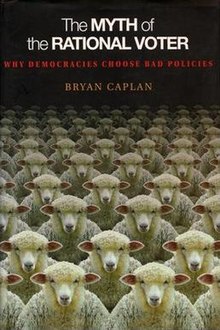The Myth of the Rational Voter

Cover of the first edition
|
|
| Author | Bryan Caplan |
|---|---|
| Country | United States |
| Language | English |
| Publisher | Princeton University Press |
|
Publication date
|
2007 |
| Media type | Print (Hardback) |
| Pages | 276 (2007 edition) |
| ISBN | (2007 edition, hbk) |
| OCLC | 71581737 |
| 320.6 22 | |
| LC Class | HD87 .C36 2007 |
The Myth of the Rational Voter: Why Democracies Choose Bad Policies is a 2007 book by Bryan Caplan, in which Caplan challenges the notion that voters are reasonable people that society can trust to make laws. Rather, Caplan contends that voters are irrational in the political sphere and have systematically biased ideas concerning economics.
Throughout the book, Caplan focuses on voters’ opinion of economics since so many political decisions revolve around economic issues (immigration, trade, welfare, economic growth, and so forth). Using data from the Survey of Americans and Economists on the Economy, Caplan categorizes the roots of economic errors into four biases: make-work, anti-foreign, pessimistic, and anti-market.
Caplan refers to the make-work bias as a "tendency to underestimate the economic benefits from conserving labor." Caplan claims that there is a tendency to equate economic growth with job creation. However, that is not necessarily true, since real economic growth is a product of increases in the productivity of labor. Dislocation and unemployment can be caused by productivity gains making certain jobs no longer necessary. All things being equal, economic rationality would require that these people make use of their talents elsewhere. Caplan makes special emphasis of the movement away from farming over the past 200 years, from nearly 95% of Americans as farmers in 1800 to just 3% in 1999, as an illustrative example. As an economy industrialises, increased labor productivity in agriculture means less labor is needed to produce a given quantity of agricultural goods, freeing up labour (a scarce resource) to be employed in the production of manufactured goods and services.
Caplan refers to the anti-foreign bias as a "tendency to underestimate the economic benefits of interaction with foreigners." People systematically see their country of origin as in competition with other nations and so oppose free trade with them. Foreigners are seen as the "enemy" even if the two governments are at a lasting peace. The principles of comparative advantage allow two countries to benefit a great deal from trade. The degree of benefit is rarely equalized, but it is always positive for both parties. Caplan notes how the anti-foreign bias can be rooted in pseudo-racist attitudes. For Americans, trading with Japan and Mexico is more controversial than trading with Canada and England, the latter of which mostly speaks our language and looks like white Americans.
...
Wikipedia
